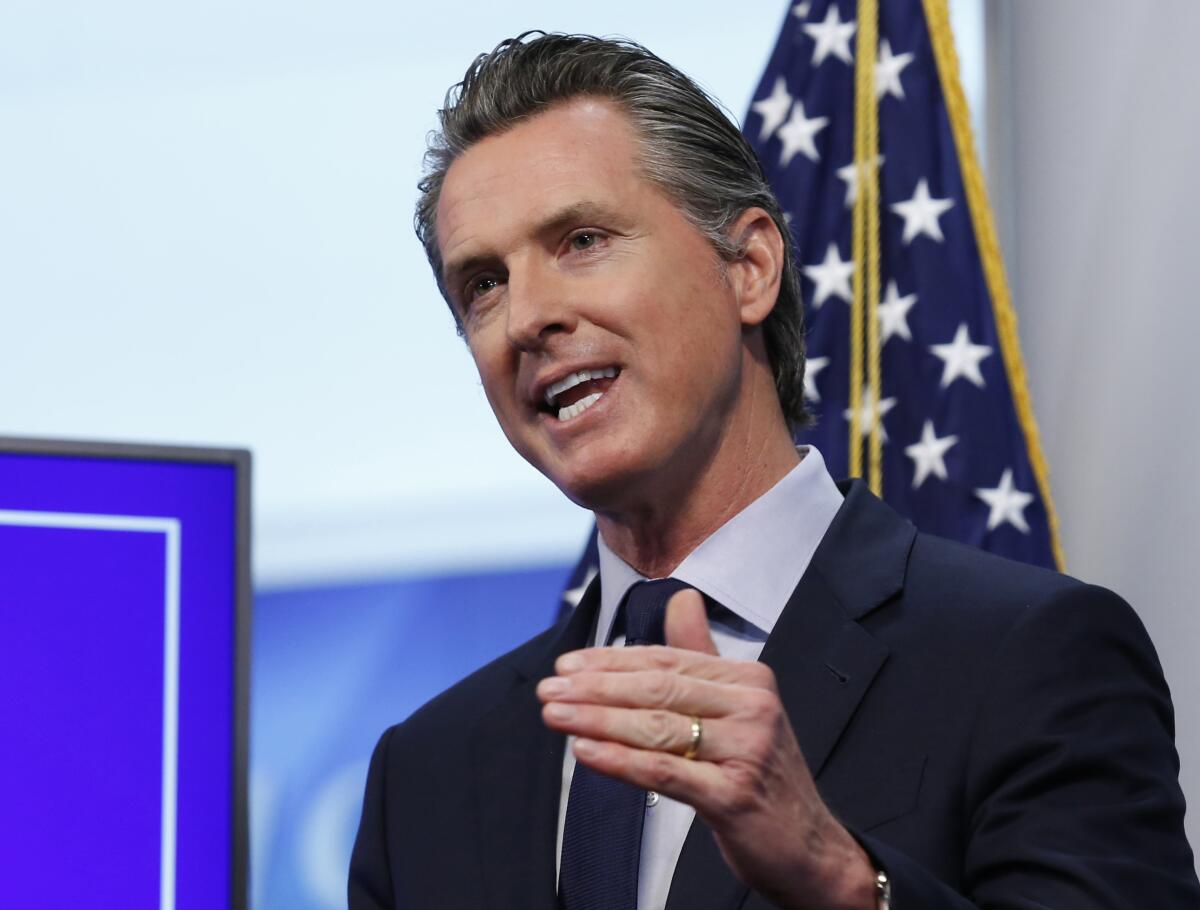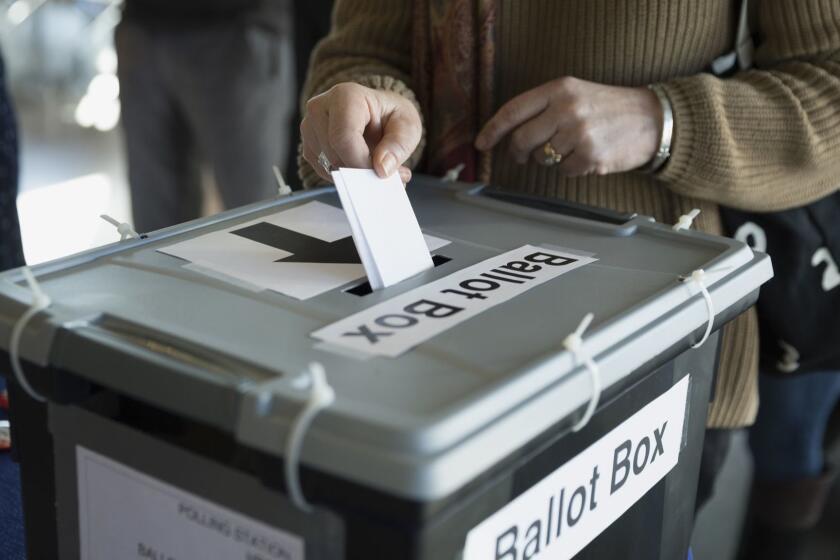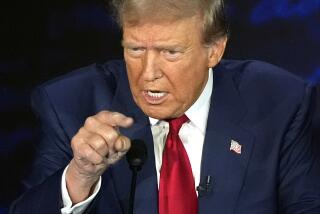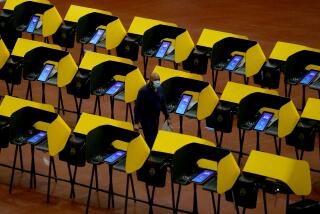Californians broadly trust state government on coronavirus — but mistrust Trump, poll finds

California voters give broad approval to Gov. Gavin Newsom amid the coronavirus crisis, and despite widely felt economic pain, large majorities want to go slow on ending stay-at-home orders, a new statewide poll finds.
The poll from the UC Berkeley Institute of Governmental Studies documents the hardship caused by the pandemic and the economic disruption surrounding it. The poll found 16% of California voters already reporting that they were unemployed when the survey was taken, April 16-20.
Nearly 4 in 10 expect they may lose their job as a result of the pandemic, with that concern heaviest among the state’s African American and Latino populations and those without a college education. Nearly 7 in 10 voters fear the possibility of getting sick with COVID-19, the illness caused by the coronavirus.
Nine in 10 voters say they see the pandemic as a threat to their personal or family health, with 52% calling it a major threat; 83% call it a threat to their personal finances.
Amid that widespread anxiety and disruption, voters want officials to take their time about ending restrictions on business and public gatherings. By 70% to 30%, the state’s voters say they’re more worried that shelter-in-place orders will end too soon, causing the illness to spread more, than they are that such orders will continue for too long and damage the economy.
Voters express considerable confidence in the state government, which, along with local officials, have imposed orders banning public gatherings and closing many businesses.
Newsom benefits from that, with 70% of California voters approving of how he’s doing his job, the poll finds. The governor’s high standing and the priority voters put on keeping restrictions in place to protect health could give him considerable leeway to take controversial decisions, such as his order Thursday to keep Orange County beaches closed.
The governor’s standing is up 10 points from the last time the Berkeley IGS poll asked about it, in September. The increase reflects significant upticks in the share of Republicans and self-described moderates who say they approve of the job the liberal Democratic governor is doing.
That increase fits a nationwide pattern in which governors of both parties who have ordered aggressive measures to combat the spread of the virus have seen a positive response from voters.
“That’s what we’d normally expect to see,” said UC Berkeley political science professor Eric Schickler, co-director of the Institute of Governmental Studies. Across the country, “governors are benefiting” from the tendency of voters to rally around their leaders, at least initially, “during a time of national crisis.”
President Trump, Schickler noted, is the great exception to that rule, a head of government who has not had a significant rallying moment as a result of the crisis.
The poll bears that out. California voters have much less confidence in the federal government and Trump, whom many of them blame for problems with the national response to the virus: 61%, for example, say the president is mostly or completely responsible for the shortages of tests and medical supplies that have dogged efforts to combat the virus.
Only about 2.5% of the state’s voters report that they’ve been tested, with an additional 6% saying they have tried to get a test and were unable to do so. About one-third say they know someone who has been tested, and about half of those say they know someone who has tested positive.
Slightly less than 4 in 10 state voters say they have confidence in the federal government’s response to the pandemic. A similar share say they trust national leaders to provide accurate information about the disease, compared with 6 in 10 who do not trust them.
National leaders rank slightly below television news (49%) and considerably below newspapers (60%) as a source of information that voters at least somewhat trust, the poll found.
By contrast, 77% trust state and local leaders to provide accurate information, 87% trust the Centers for Disease Control and Prevention, and 92% trust scientific experts such as university researchers.
The UC Berkeley poll was conducted by email in English and Spanish among 8,800 registered voters statewide, an unusually large sample that allows detailed analysis of sub-groups. The results have an estimated margin of error of 3 percentage points in either direction.
Because the poll questioned registered voters, it may not completely capture the extent of economic disruption the pandemic has caused. While about 82% of eligible California adults are registered to vote, those who are not registered are, on average, younger and poorer.
The UC Berkeley Institute of Governmental Studies poll that The Times is publishing uses a method that differs from traditional phone-based surveys.
The poll reveals the strong impact that partisanship, and views of Trump, have on how people view the pandemic. Just 30% of the state’s voters approve of the way the president is handling his job, with 20% approving strongly. By contrast, 64% disapprove, with 55% doing so strongly.
The minority who strongly approve of Trump and those who identify themselves as conservative have notably different views of the pandemic than the rest of the state’s voters.
Just over half of voters statewide say they see COVID-19 as a “major threat” to their personal or family health. That share falls to just over one-third among those who identify as “very conservative.”
Perception of the illness as a major threat is also somewhat higher in Los Angeles County, which has had the most confirmed cases, than in some other parts of the state.
In L.A. County, 56% say they see the illness as a major threat, while in the Central Valley, San Diego and Orange counties and the far northern parts of the state, concern is slightly below the state average, between 48% and 49%. The level of concern in the Bay Area and the Inland Empire is at the state average.
Those who strongly support Trump are less likely to believe that social distancing measures are effective in combating the virus and oppose continuing them, although even among that group, 57% say that staying home as much as possible is an “extremely effective” method of stopping the spread of the disease.
Among those who strongly disapprove of Trump, the share who see staying at home as extremely effective is much higher, 90%.
Similar gaps showed up in questions about the effectiveness of wearing masks and staying six feet away from other people.
Strong supporters of Trump are also somewhat more likely than the rest of the state’s voters to say that eating a healthful diet or taking vitamins are effective ways to stave off the illness. Medical experts say that’s not the case.
The numbers show the power that partisanship has to affect people’s opinions, said IGS co-director G. Cristina Mora, associate professor of sociology at UC Berkeley.
“When it hits at your everyday behaviors, that’s particularly striking,” Mora said.
Trump has vacillated in his support for social distancing.
The White House coronavirus task force has repeatedly urged Americans to stay at home, maintain distance from other people and wear masks in public.
At times, Trump has backed that message. At other times, he has called for quickly ending restrictions on commerce and public gatherings and has supported protesters who have demonstrated in California and other states to call for rolling back the rules. He has also publicly said that he won’t wear a mask.
Those who want commerce reopened quickly say they fear the damage to the economy from closures outweighs the injury caused by the virus. Strong Trump supporters embrace that view, in sharp contrast with the rest of the state’s voters: By 78% to 22%, Trump’s strong backers say they worry more that the restrictions will be kept in place too long and damage the economy than that they’ll be ended too quickly.
By contrast, African American and Latino voters, although they report more economic distress, are less likely to support a quick end to the stay-at-home restrictions.
By a wide margin, 70% to 8%, with 22% unsure, California voters say they believe that the economic damage is leading to more inequality in the U.S. The poll provides extensive evidence to back that belief, finding that the cost has fallen most heavily on people of color and those with the lowest incomes.
About 30% of Latino voters say the pandemic has caused them to lose income because of reduced hours at work, and an additional 18% say it has caused them to be laid off. That’s almost twice the share of white voters who say they’ve suffered from lost hours or a layoff. African American and Asian American voters fall between the other two groups.
White voters and those with incomes greater than $100,000 a year are far more likely than others to say that the pandemic has caused a loss of money in the stock market or retirement funds, reflecting their greater likelihood of having investments in the first place.
Just over half of those who earn less than $20,000 a year see the pandemic as a major threat to their employment, more than twice the level among those earning $200,000 or more. Latinos, at 49%, and African Americans, at 44%, are more likely than whites, 30%, to see a major threat to their employment. Asian Americans, at 42%, fall close to the statewide average.
Similarly, 37% of Latinos said they faced a “very serious” risk of being unable to work remotely or working under dangerous conditions, compared with 16%of whites, 26% of African Americans and 28% of Asian Americans.
Just over half of the state’s voters say they are currently working, with 23% retired and 9% students in addition to the 16% who are unemployed.
Of those who are working, just over half say they are able to work from home, and about 1 in 5 say they leave home to go to work but that their work involves minimal contact with other people.
That leaves 23% of the state’s workforce, or about 1 in 8 voters, working in jobs that require regular contact with other people. That share is highest among those with no more than high school or trade school degrees and lowest among those with college or graduate degrees, the poll found.
Also among those who are working, 37% said they expected they would not get paid or would lose their jobs if they got sick and couldn’t work for two weeks or more, while 53% said they expected they would still be paid and 10% were unsure.
Not surprisingly, those with the lowest incomes and least education were most likely to be at risk of not being paid. Among those earning $200,000 or more, 72% said they expected their pay would continue if they couldn’t work; that fell to 24% among those earning less than $20,000.
A large share of California voters say they worry they might inadvertently spread the illness to others. Contrary to the stereotype of young people not taking the virus seriously, that concern is most widespread among voters between 18 and 35, with nearly 6 in 10 saying they are “very concerned” about infecting others.
Despite such worries, however, only 19% of the state’s voters said that since the coronavirus outbreak, they were “rarely” feeling happy or satisfied with their lives. Just over one-third said they were “sometimes” happy or satisfied, while most, 45%, said they remained happy or satisfied “often” or “very often.”
More to Read
Get the L.A. Times Politics newsletter
Deeply reported insights into legislation, politics and policy from Sacramento, Washington and beyond. In your inbox three times per week.
You may occasionally receive promotional content from the Los Angeles Times.












